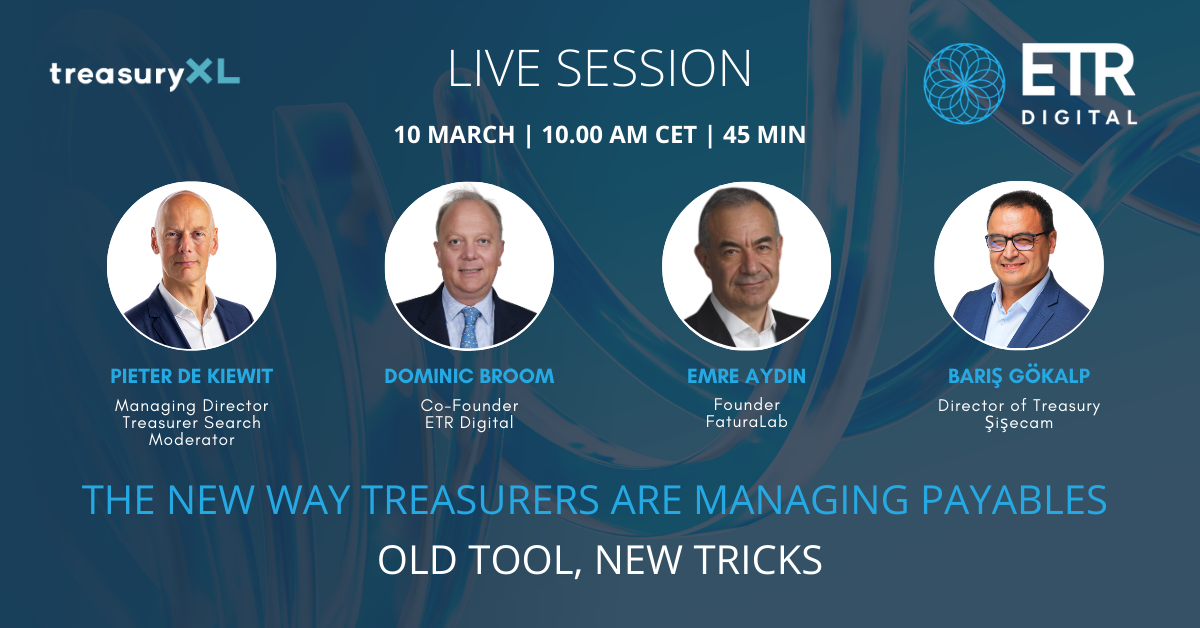Make room for the treasury controller!
| 01-05-2018 | Pieter de Kiewit |
 Lately we have received an increasing number of calls from companies asking about treasury controllers. For various reasons this is understandable, but they are not the easiest to find and there is appears to be quite a wide variety. Let’s elaborate.
Lately we have received an increasing number of calls from companies asking about treasury controllers. For various reasons this is understandable, but they are not the easiest to find and there is appears to be quite a wide variety. Let’s elaborate.
Over the last few years, many corporates have been quite frugal in their investments, also in treasury. Times were hard. Now funds are getting available, there is willingness to hire, also treasury controllers. The rising investments in treasury IT, also related to aforementioned funds, often leads to less work for the back office and possibly also the front office. Platforms like 360T or FXAll are examples, but also algo trading. Choosing the system and taking care of what it should do and what it actually does, is often one of many tasks of the treasury controller.
The chaos in the financial markets made regulators increase the number of rules that banks and also corporates have to follow. Furthermore companies expanding globally, and funding their subsidiaries have to following strict internal and external (fiscal and banking) rules. Implementing this framework and being compliant can also be an important task of a treasury controller.
F&A and corporate treasury have been quite well at co-existing in separate worlds and not bothering each other. F&A wants to be in control and appreciates predictability. Treasury is motivated by the dynamics of the markets and adrenaline. But companies integrate functionalities and the treasury controller will build the bridge.
Now why is the search quite hard? First of all because of the drivers mentioned in the last paragraph: the treasurer does not like too much predictability and the controller does not (want to) understand the financial markets. And having thorough knowledge of several functionalities: bookkeeping, IT, regulatory and risk management and make them work well together is not easy. Finally not many corporate treasuries are big enough for a qualified treasury controller. This leads to well paid Big4 auditors and bank controllers. And us having search assignments. Any thoughts and are you interested?
We would like to hear from you,
Pieter, Heleen and Kim
Pieter de Kiewit
[email protected] / +31 6 1111 9783

Pieter de Kiewit
Owner Treasurer Search

 Last year I wrote a blog on the Hyperledger project and what that could mean for blockchain acceptance (see my blog: Hyperledger Project: collaboration pays off, 9 April 2017). We are now almost a year later and I am wondering if they are meeting my expectations. “2017 was a milestone year for Hyperledger both for new members and for new technical breakthroughs. In 2017 we doubled our membership, gaining companies like American Express, Cisco, Daimler and Baidu, and we’re expecting more companies and organizations to join in 2018.” Brian Behlendorf, Executive Director, Hyperledger.
Last year I wrote a blog on the Hyperledger project and what that could mean for blockchain acceptance (see my blog: Hyperledger Project: collaboration pays off, 9 April 2017). We are now almost a year later and I am wondering if they are meeting my expectations. “2017 was a milestone year for Hyperledger both for new members and for new technical breakthroughs. In 2017 we doubled our membership, gaining companies like American Express, Cisco, Daimler and Baidu, and we’re expecting more companies and organizations to join in 2018.” Brian Behlendorf, Executive Director, Hyperledger.
 It is the talk of the town – US 10 year Government bond yields are rising and testing the perceived psychological level of 3 per cent. At the same time the whole yield curve is flattening – the spreads are diminishing. There are growing concerns about rising inflation, along with fears of trade wars and rising oil prices. When the threat of inflation occurs, there is a selloff in bonds and their yield goes higher. At the same time as the yield curve is flattening there is talk of the yield curve becoming inverted which, historically, is seen as the precursor to a recession. Conflicting signals – what does it all mean?
It is the talk of the town – US 10 year Government bond yields are rising and testing the perceived psychological level of 3 per cent. At the same time the whole yield curve is flattening – the spreads are diminishing. There are growing concerns about rising inflation, along with fears of trade wars and rising oil prices. When the threat of inflation occurs, there is a selloff in bonds and their yield goes higher. At the same time as the yield curve is flattening there is talk of the yield curve becoming inverted which, historically, is seen as the precursor to a recession. Conflicting signals – what does it all mean? We live in the world of Big Data – we are told that there is so much potential that can be unleashed by embracing Big Data. This can lead to business efficiency, increased revenue, reduced expenditure, earlier identification of fraud etc. But for all this to reach fruition, we need to rely on the most basic building block – Static Data. Many companies have grand ideas of how to maximise revenue with data streams, yet fail to grasp the essential need for good, sound, structured Static Data.
We live in the world of Big Data – we are told that there is so much potential that can be unleashed by embracing Big Data. This can lead to business efficiency, increased revenue, reduced expenditure, earlier identification of fraud etc. But for all this to reach fruition, we need to rely on the most basic building block – Static Data. Many companies have grand ideas of how to maximise revenue with data streams, yet fail to grasp the essential need for good, sound, structured Static Data. The Old Lady has a long history – the second oldest central bank, who has always kept the market in check. Whilst the financial Big Bang of 1986 changed the landscape in the Square Mile, her power and influence are still very evident. On Wednesday, she surprised the banking market by granting direct access to her interbank payments system to a Fintech company. This means that they can process their payments without having to use a commercial bank as an intermediary. What is the motivation for this step and what are the consequences?
The Old Lady has a long history – the second oldest central bank, who has always kept the market in check. Whilst the financial Big Bang of 1986 changed the landscape in the Square Mile, her power and influence are still very evident. On Wednesday, she surprised the banking market by granting direct access to her interbank payments system to a Fintech company. This means that they can process their payments without having to use a commercial bank as an intermediary. What is the motivation for this step and what are the consequences?

